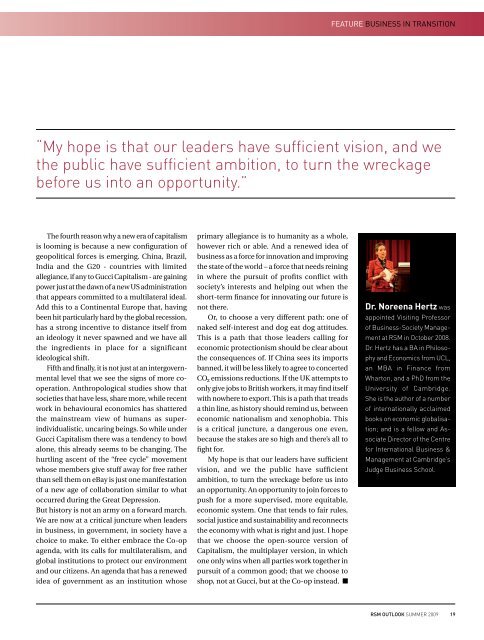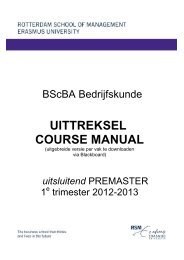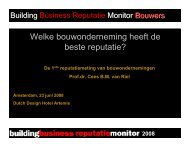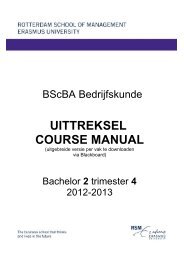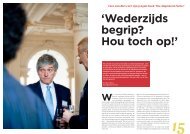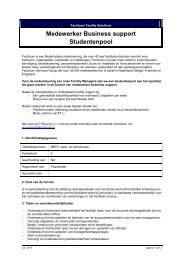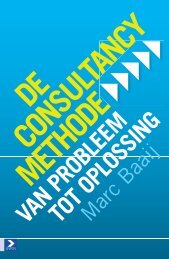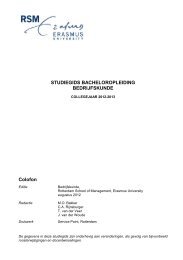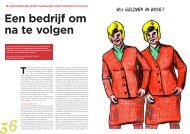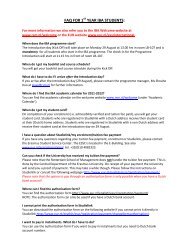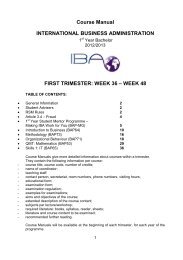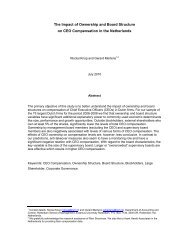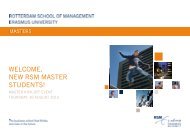here - Rotterdam School of Management
here - Rotterdam School of Management
here - Rotterdam School of Management
You also want an ePaper? Increase the reach of your titles
YUMPU automatically turns print PDFs into web optimized ePapers that Google loves.
“My hope is that our leaders have sufficient vision, and we<br />
the public have sufficient ambition, to turn the wreckage<br />
before us into an opportunity.”<br />
The fourth reason why a new era <strong>of</strong> capitalism<br />
is looming is because a new configuration <strong>of</strong><br />
geopolitical forces is emerging. China, Brazil,<br />
India and the G20 - countries with limited<br />
allegiance, if any to Gucci Capitalism - are gaining<br />
power just at the dawn <strong>of</strong> a new US administration<br />
that appears committed to a multilateral ideal.<br />
Add this to a Continental Europe that, having<br />
been hit particularly hard by the global recession,<br />
has a strong incentive to distance itself from<br />
an ideology it never spawned and we have all<br />
the ingredients in place for a significant<br />
ideological shift.<br />
Fifth and finally, it is not just at an intergovernmental<br />
level that we see the signs <strong>of</strong> more cooperation.<br />
Anthropological studies show that<br />
societies that have less, share more, while recent<br />
work in behavioural economics has shattered<br />
the mainstream view <strong>of</strong> humans as superindividualistic,<br />
uncaring beings. So while under<br />
Gucci Capitalism t<strong>here</strong> was a tendency to bowl<br />
alone, this already seems to be changing. The<br />
hurtling ascent <strong>of</strong> the “free cycle” movement<br />
whose members give stuff away for free rather<br />
than sell them on eBay is just one manifestation<br />
<strong>of</strong> a new age <strong>of</strong> collaboration similar to what<br />
occurred during the Great Depression.<br />
But history is not an army on a forward march.<br />
We are now at a critical juncture when leaders<br />
in business, in government, in society have a<br />
choice to make. To either embrace the Co-op<br />
agenda, with its calls for multilateralism, and<br />
global institutions to protect our environment<br />
and our citizens. An agenda that has a renewed<br />
idea <strong>of</strong> government as an institution whose<br />
primary allegiance is to humanity as a whole,<br />
however rich or able. And a renewed idea <strong>of</strong><br />
business as a force for innovation and improving<br />
the state <strong>of</strong> the world – a force that needs reining<br />
in w<strong>here</strong> the pursuit <strong>of</strong> pr<strong>of</strong>its conflict with<br />
society’s interests and helping out when the<br />
short-term finance for innovating our future is<br />
not t<strong>here</strong>.<br />
Or, to choose a very different path: one <strong>of</strong><br />
naked self-interest and dog eat dog attitudes.<br />
This is a path that those leaders calling for<br />
economic protectionism should be clear about<br />
the consequences <strong>of</strong>. If China sees its imports<br />
banned, it will be less likely to agree to concerted<br />
CO ² emissions reductions. If the UK attempts to<br />
only give jobs to British workers, it may find itself<br />
with now<strong>here</strong> to export. This is a path that treads<br />
a thin line, as history should remind us, between<br />
economic nationalism and xenophobia. This<br />
is a critical juncture, a dangerous one even,<br />
because the stakes are so high and t<strong>here</strong>’s all to<br />
fight for.<br />
My hope is that our leaders have sufficient<br />
vision, and we the public have sufficient<br />
ambition, to turn the wreckage before us into<br />
an opportunity. An opportunity to join forces to<br />
push for a more supervised, more equitable,<br />
economic system. One that tends to fair rules,<br />
social justice and sustainability and reconnects<br />
the economy with what is right and just. I hope<br />
that we choose the open-source version <strong>of</strong><br />
Capitalism, the multiplayer version, in which<br />
one only wins when all parties work together in<br />
pursuit <strong>of</strong> a common good; that we choose to<br />
shop, not at Gucci, but at the Co-op instead.<br />
FEATURE BUSINESS IN TRANSITION<br />
Dr. Noreena Hertz was<br />
appointed Visiting Pr<strong>of</strong>essor<br />
<strong>of</strong> Business-Society Manage-<br />
ment at RSM in October 2008.<br />
Dr. Hertz has a BA in Philoso-<br />
phy and Economics from UCL,<br />
an MBA in Finance from<br />
Wharton, and a PhD from the<br />
University <strong>of</strong> Cambridge.<br />
She is the author <strong>of</strong> a number<br />
<strong>of</strong> internationally acclaimed<br />
books on economic globalisation;<br />
and is a fellow and Associate<br />
Director <strong>of</strong> the Centre<br />
for International Business &<br />
<strong>Management</strong> at Cambridge’s<br />
Judge Business <strong>School</strong>.<br />
RSM OUTLOOK SUMMER 2009 19


